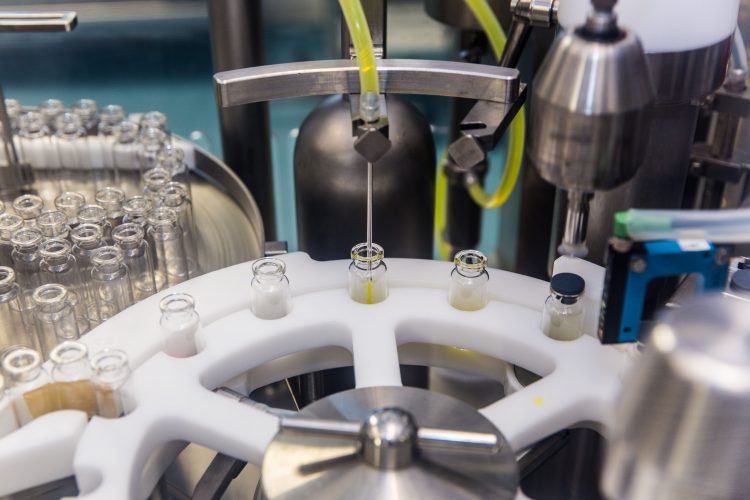Supporting the pharmaceutical industry – how a CDMO can help
Posted: 9 July 2025 | European Pharmaceutical Review | No comments yet
After their recent webinar, European Pharmaceutical Review’s Head of Content Ian Betteridge spoke with the team at Adragos Pharma to discuss the role of a CDMO and their importance in the fill and finish sector.


What is the role of a CDMO during the fill and finish stage in pharmaceutical manufacturing? Why is it important?
Contract development and manufacturing organisations (CDMO’s) play a pivotal role in the final critical stage of pharmaceutical manufacturing: transforming bulk drug substance into market-ready products through aseptic fill and finish operations.
At Adragos Pharma, we specialise in work from small molecules to large molecules. We offer end-to-end services for small molecule finished dosage forms (FDFs), including sterile and non-sterile liquids, solids, and semi-solids products. Our Swiss site is also specialised in biologicals, orphan drugs, clinical trials, fill-and-finish, and lyophilisation.
The importance of fill and finish cannot be overstated. It represents one of the highest-risk stages in sterile pharmaceutical manufacturing”
The importance of fill and finish cannot be overstated. It represents one of the highest-risk stages in sterile pharmaceutical manufacturing, where even minute contamination can render entire batches unusable. Many pharmaceutical companies, particularly those developing innovative biologics or vaccines, lack the specialised facilities, expertise, or economic justification to build their own aseptic manufacturing capabilities.
By partnering with a dedicated CDMO like Adragos, they gain access to state-of-the-art GMP and EMA/FDA-certified facilities, experienced operators trained in aseptic processing, and the flexibility to scale from small clinical batches to commercial volumes without the substantial capital investment and regulatory burden of building in-house capabilities.
In your experience, when is the best time for a drug developer to involve a CDMO in the aseptic fill and finish process?
The optimal time is far earlier than most companies realise, ideally during late preclinical or early Phase I planning, rather than waiting until manufacturing needs become urgent. Our experience with one US vaccine developer highlighted this perfectly: by engaging with us early in the process, we could collaborate on critical aspects like active pharmaceutical ingredient (API) handling protocols, sedimentation studies, and analytical method development that proved essential for the project’s success.
Early involvement allows us to work together on process design, understanding the unique characteristics of the drug substance, and developing bespoke solutions for any technical challenges. This collaborative approach enabled us to implement customised aseptic processing simulations and establish comprehensive documentation for API traceability before production began.
Companies that wait until they are under time pressure for clinical material often find themselves constrained by suboptimal processes or forced into expensive last-minute modifications. The four-year progression from Phase I to Phase III in our case study was facilitated by this early, strategic partnership approach, where we became an extension of their development team rather than merely a service provider.
ON-DEMAND WEBINAR: Fast tracking clinical success: choosing the right Fill & Finish CDMO
What are some major criteria pharma companies should consider when selecting a CDMO?
Technical capability and regulatory compliance form the foundation, but flexibility and collaborative approach often prove decisive. Companies should evaluate whether a CDMO can handle their specific product requirements (in our case, we managed over 30 unique APIs with complex handling needs) or implementing analytical methods that comply with both US and European Pharmacopoeia standards. GMP and EMA + FDA certification if using in US is non-negotiable, but it is important to assess a CDMO’s track record with similar product types and their ability to adapt processes to unique requirements.
Equally important is the CDMO’s capacity for genuine partnership. Our success with the vaccine developer stemmed from our willingness to develop bespoke solutions, from customised documentation systems to flexible scheduling that aligned with their clinical timelines. Consider their communication approach, project management capabilities, and how they handle unexpected challenges—because there will be challenges. Finally, evaluate their scalability and long-term viability: can they grow with your programme from clinical through commercial phases?
The ongoing collaboration we maintain, including current work on filling line upgrades, demonstrates the value of a CDMO that views client relationships as strategic partnerships rather than transactional arrangements. Quality, compliance, and technical competences are table stakes; the differentiator lies in collaborative problem-solving and adaptive capability.
How does Adragos Pharma ensure the quality of products manufactured through its CDMO services?
Quality assurance (QA) is at the core of our operations. Our dedicated QA department ensures that all products we manufacture meet stringent regulatory requirements and client specifications. With extensive experience handling products for markets such as Japan, Europe, and the US, our QA team continuously navigates changing regulatory landscapes. Each step in our manufacturing process is supplemented by robust quality checks, and our systems are designed to mitigate risks and ensure compliance with health authorities.
Can you share insights from specific case studies that highlight the effectiveness of choosing the right CDMO for fill and finish?
future success demands CDMO’s that champion sustainability and supply chain resilience”
When a prominent US vaccine developer faced the complex challenge of producing three different concentrations within tight timelines, critical for maintaining product shelf-life comparability, they needed more than basic manufacturing capacity. The project demanded expertise in handling over 30 unique APIs, implementing bespoke aseptic processing simulations, and implementing analytical methods compliant with both US and European Pharmacopoeia standards.
Our ability to provide flexible scheduling, customised documentation for full API traceability, and dedicated turbidimetry analysis for suspension homogeneity proved essential in navigating these multifaceted requirements.
The results speak volumes about the strategic importance of CDMO selection: the client progressed from Phase I to Phase III clinical trials in just four years—a remarkably swift timeline in vaccine development.
flexibility becomes crucial as the pharmaceutical landscape shifts towards personalised medicines and accelerated development timelines”
This acceleration was not merely down to luck or favourable regulatory conditions, but rather the seamless collaboration enabled by choosing a CDMO that could adapt its processes to unique client specifications while maintaining GMP and also FDA certification standards required in the present case. The ongoing partnership, including current work on revamping filling lines, illustrates how the right CDMO relationship evolves into a strategic asset rather than a mere service provision. For companies developing complex biologics, this case underscores that CDMO selection should prioritise technical adaptability and collaborative problem-solving over simple cost considerations.
What do you envision for the future of CDMOs in supporting clinical success?
The future of CDMO’s lies in evolving from manufacturing service providers to integrated development partners embedded throughout the clinical journey. At Adragos, we are already demonstrating this shift through early involvement in process design and analytical method development, becoming as valuable for strategic guidance as manufacturing capability.
Digital transformation will fundamentally reshape [the fill finish sector]”
Digital transformation will fundamentally reshape our industry. AI-driven process control, real-time quality monitoring, and predictive manufacturing will enable facilities to rapidly reconfigure for different therapeutic modalities while maintaining the highest standards. This flexibility becomes crucial as the pharmaceutical landscape shifts towards personalised medicines and accelerated development timelines.
Most importantly, future success demands CDMO’s that champion sustainability and supply chain resilience. The industry cannot afford current environmental impacts or vulnerabilities exposed by recent global disruptions.
At Adragos, we are preparing for a future where green chemistry, circular manufacturing processes, and distributed production networks become competitive advantages. The CDMO’s that thrive will demonstrate how environmental responsibility and operational excellence can accelerate clinical success while building a more sustainable pharmaceutical ecosystem.
Related topics
Aseptic Processing, Big Pharma, Clinical Development, Contract Manufacturing, Drug Development, Drug Manufacturing, Good Manufacturing Practice (GMP), Industry Insight, Interviews, Manufacturing, Outsourcing, Processing, Production, QA/QC, Research & Development (R&D), Technology, Therapeutics









